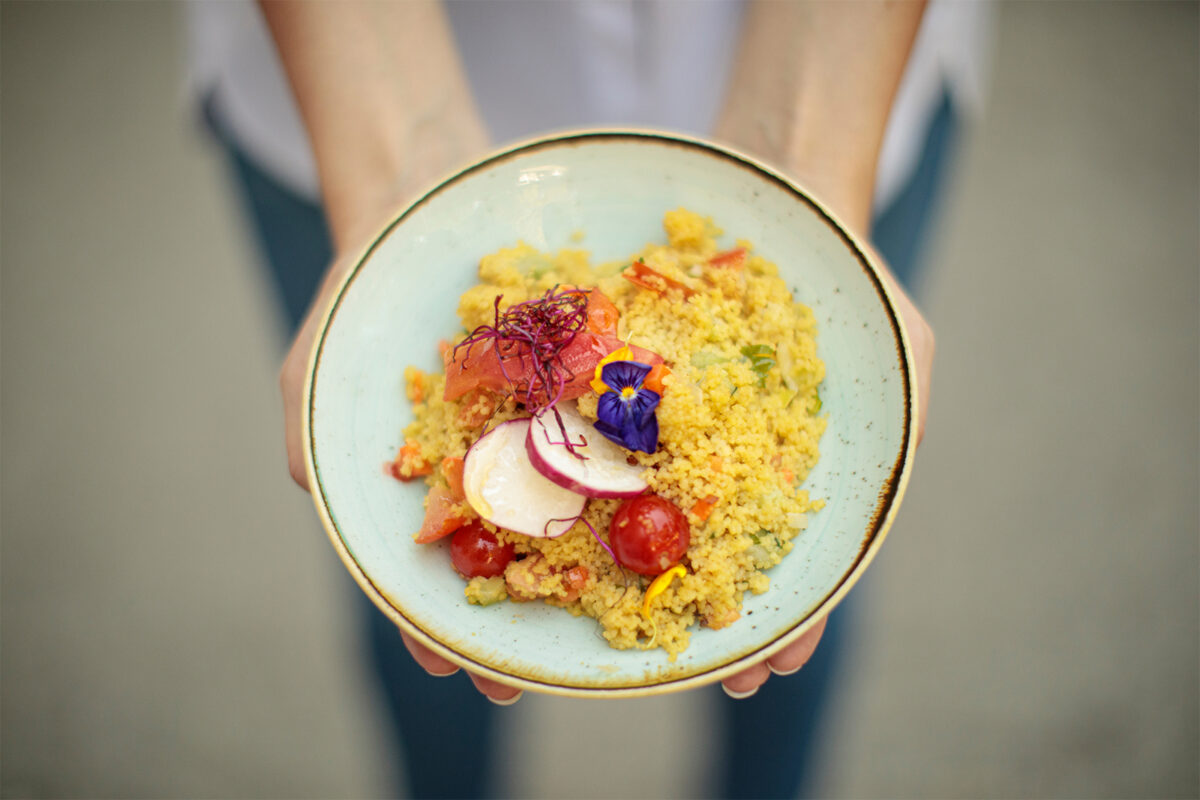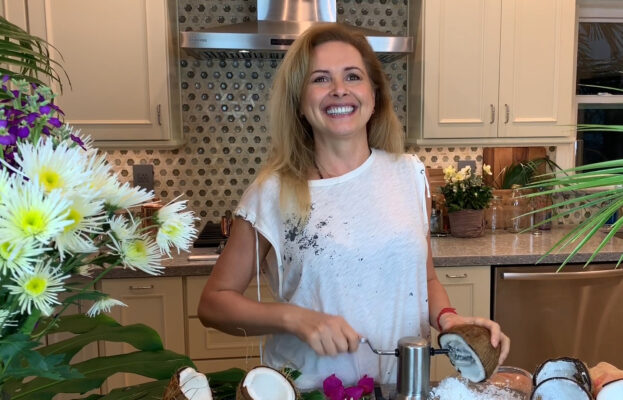This practice is designed to help you develop a mindful eating practice that incorporates techniques to reframe and manage your inner critic.
The beauty of what you’re learning here goes beyond just meals. These techniques, such as sharpening your focus, being mindful of your thoughts, and fostering a gentler approach to yourself, can be applied in all areas of life.
In essence, it equips you with the tools to manage that internal negativity, encourages a more compassionate self-relationship, and helps to redefine your relationship with food. The outcome? Not only do you enhance your enjoyment of meals, but you’re enriching your overall life experience.
PRACTICE GUIDE
Reframing the Inner Critic 💫
✧ Settle down. Find a quiet, comfortable place where you can focus on your meal without any distractions. Get settled in a relaxed position where you feel both alert and at ease.
✧ Appreciate Your Meal. Take a moment to truly appreciate the meal or snack in front of you. Take in the colors, how it’s laid out on the plate, and any small details that catch your eye. Take a deep breath and enjoy the smells, letting them wake up your senses and build your appetite.
✧ Start Eating Mindfully. Now, focus on eating. Start with small, slow bites, really paying attention to the feel of the food. Notice how it feels in your mouth—the texture, the temperature, and how it changes as you chew.
✧ Savor the Flavors. As you keep eating, let your focus move to the flavors that come out on your tongue. Take your time to really taste the food, paying attention to small changes or surprising flavors. Use all your senses in this process, enjoying the look, smell, and taste of your meal.
✧ Recognize Your Inner Critic. You might notice your inner critic start to chime in. Picture it as a small icon, like the voice of doubt in your mind. Understand it’s there, but remember it doesn’t need to be in control of your experience. Instead, let it take a back seat, allowing your focus to be on the great sensory experience of eating.
✧ Reframe the Inner Critic. If your inner critic starts to get loud, step in with kindness. See yourself as the understanding observer of your thoughts, with the power to guide your attention. With detachment and self-compassion, gently bring your focus back to the present moment. Picture the critic icon shrinking back to a manageable size, peacefully coexisting with the other sensations in your mind.
✧ Return to Mindful Eating. Keep eating mindfully, using all your senses to really be in the moment. As you savor each bite, notice the mix of flavors and textures, developing a deep appreciation for the nourishment and enjoyment that food brings. If at any point your inner critic tries to take over, calmly repeat the process of recognizing it and gently shifting your focus back to eating.
✧ Cultivate Kindness and Awareness. Remember, this practice is about building mindful awareness and treating the presence of your inner critic with kindness. By keeping this balanced perspective, you can make your eating experience more enjoyable and nourishing. Over time, this mindfulness can extend to other parts of your life, helping you be more compassionate to yourself and resilient.
✧ Conclude the Practice. Take a few moments to finish this practice, enjoying the last bites of your meal or snack. Notice any feelings of thankfulness for the nourishment and the chance to practice mindful eating. When you’re ready, slowly get back to your regular activities, keeping this mindfulness with you for the rest of the day.
As you continue this practice, you’ll cultivate a healthier relationship with food and learn to manage your inner critic more effectively. Over time, the mindfulness and resilience you build can extend to other areas of your life, leading to an overall improvement in well-being.

Potential benefits of this practice are:
- Eating: This practice helps you develop a mindful eating habit, allowing you to fully engage with the present moment and experience the sensory pleasures of eating. By paying attention to the colors, smells, tastes, textures, and sounds of your food, you can enhance your overall enjoyment and satisfaction from meals.
- Inner Critic Management: The practice offers techniques to reframe and manage your inner critic. By acknowledging the presence of your inner critic and consciously choosing to shift your focus away from its negative thoughts, you can reduce its influence and create a more compassionate and supportive inner dialogue.
- Increased Self-Compassion: By recognizing and reframing the inner critic, this practice encourages a kinder and more compassionate relationship with yourself. As you develop the ability to treat yourself with understanding and gentleness, you cultivate self-compassion, which can positively impact your overall well-being and self-esteem.
- Improved Relationship with Food: Mindful eating and inner critic management can help transform your relationship with food. Instead of feeling judgment, guilt, or shame around eating, you can develop a healthier and more positive attitude. This practice allows you to appreciate the nourishment and pleasure that food brings, promoting a balanced approach to eating.
- Mindfulness Beyond Mealtimes: The skills and awareness cultivated through this practice can extend beyond mealtime experiences. By learning to shift your focus, manage your thoughts, and cultivate self-compassion, you can apply these principles to other aspects of your life. This can lead to reduced stress, increased resilience, and a greater sense of overall well-being.
This practice addresses the problems of mindless eating, negative self-talk, and a critical inner dialogue. It provides tools to reframe and manage the inner critic, fostering self-compassion and a more positive relationship with food and oneself.
Taking a step back, what is this practice really about? It’s addressing significant issues that many of us grapple with. Have you ever noticed yourself eating without paying much attention to the process? Or do you find an internal voice often bringing you down? And then there’s our relationship with food, which can sometimes be quite complex. This practice is designed to help with all these aspects.
Consider moments of stress. Now, equipped with these skills, instead of feeling overwhelmed, you can navigate through challenges with more calm and clarity. Or when life presents unexpected difficulties, you’re not just reacting, you’re proactively managing them. All this comes from the ability to guide your thoughts and treat yourself with kindness. It’s like having a well-crafted toolkit for a happier, healthier life.
In essence, it equips you with the tools to manage that internal negativity, encourages a more compassionate self-relationship, and helps to redefine your relationship with food. The outcome? Not only do you enhance your enjoyment of meals, but you’re enriching your overall life experience.
Be Alive 🌱
Love ❤️, Julia
GUIDED MEDITATIONS 💗
Mindful Eating Meditation
Mindful Eating 🥢
DISCLAIMER: The materials and the information contained on the Positive Pranic website are provided for general and educational purposes only and do not constitute any legal, medical, or other professional advice on any subject matter. None of the information on our videos is a substitute for a diagnosis and treatment by your health professional. Always seek the advice of your physician or other qualified health providers prior to starting any new diet or treatment and with any questions you may have regarding a medical condition. If you have or suspect that you have a medical problem, promptly contact your health care provider.


























